
Child marriage refers to a marriage or domestic partnership, formal or informal, between a child and an adult or between a child and another child.

Elopement is a marriage which is conducted in a sudden and secretive fashion, sometimes involving a hurried flight away from one's place of residence together with one's beloved with the intention of getting married without parental approval. An elopement is contrasted with an abduction, in which either the bride or groom has not consented, or a shotgun wedding in which the parents of one coerce both into marriage.
Reproductive rights are legal rights and freedoms relating to reproduction and reproductive health that vary amongst countries around the world. The World Health Organization defines reproductive rights as follows:
Reproductive rights rest on the recognition of the basic right of all couples and individuals to decide freely and responsibly the number, spacing and timing of their children and to have the information and means to do so, and the right to attain the highest standard of sexual and reproductive health. They also include the right of all to make decisions concerning reproduction free of discrimination, coercion and violence.
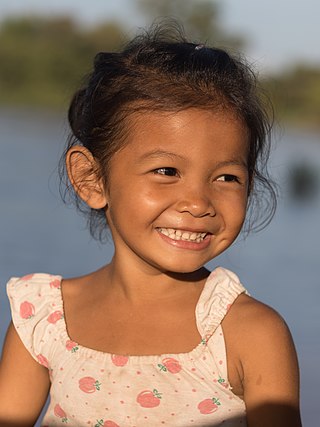
A girl is a young female human, usually a child or an adolescent. When a girl becomes an adult, she is generally referred to as a woman. However, the term girl is also used for other meanings, including young woman, and is sometimes used as a synonym for daughter or girlfriend regardless of age. In certain contexts, the usage of the term girl for an adult woman may be considered derogatory. Girl may also be a term of endearment used by an adult, usually a woman, to designate adult female friends. Girl also appears in compounds like showgirl, cowgirl, and schoolgirl.

Bride kidnapping, also known as marriage by abduction or marriage by capture, is a practice in which a man abducts the woman he wishes to marry.

Forced marriage is a marriage in which one or more of the parties is married without their consent or against their will. A marriage can also become a forced marriage even if both parties enter with full consent if one or both are later forced to stay in the marriage against their will.
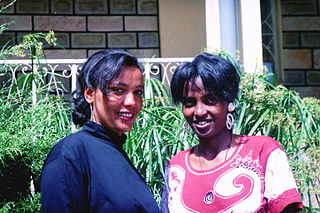
There have been several studies concerning women in Ethiopia. Historically, elite women in Ethiopia have been visible as administrators and warriors. This never translated into any benefit to improve the rights of women, but it had meant that women could inherit and own property and act as advisors on important communal matters. As late as the first part of the 20th century, Queen Menen, consort of Emperor Iyasu IV, had a decisive role in running the Ethiopian Empire. Workit and Mestayit regents to their minor sons have been held responsible for their provinces. They owed their rights to landed property because of a special type of land tenure that expected tenants to serve as militia to overlords, irrespective of gender. In 1896, Empress Tayetu Betul, wife of Emperor Menelik II, actively advised the government and participated in defending the country from Italian invasion. Prominent and other landowning women fought against the second invasion in 1935–41. With the assistance of European advisors, women in the ensuing period were kept out of the army and politics, even as advisors. Instead, they were restricted to family and household work of raising children and cooking. With a steady increase in female representation in education, they have started to undertake nursing, teaching, and other similarly supportive roles. Over the 2018–2019 period, their gradual participation in state politics has been increasing at a steady pace.

The status of women in Nepal has varied throughout history. In the early 1990s, like in some other Asian countries, women in Nepal were generally subordinate to men in virtually every aspect of life. Historically, Nepal has been a predominantly patriarchal society where women are generally subordinate to men. Men were considered to be the leader of the family and superior to women. Also, social norms and values were biased in favor of men. This strong bias in favor of sons in society meant that daughters were discriminated against from birth and did not have equal opportunities to achieve all aspects of development. Daughters were deprived of many privileges, including rights, education, healthcare, parental property rights, social status, last rites of dead parents, and were thought to be other's property and liabilities. In the past century, there has been a dramatic positive change in the role and status of women in Nepal, reducing gender inequality. While the 1990 Constitution guaranteed fundamental rights to all citizens without discrimination on the basis of ethnicity, caste, religion, or sex, the modernization of society, along with increased education of the general population, have also played an important role in promoting gender equality. The roles of women have changed in various ways in the modern Nepalese society.

Women in Nigeria are a diverse group of individuals who have a wide range of experiences and backgrounds. They are mothers, daughters, sisters, wives, entrepreneurs, professionals, and activists. Women in Nigeria face numerous challenges, including gender inequality, poverty, and a lack of access to education and healthcare. Despite these challenges, Nigerian women are making strides in all areas of life and are becoming increasingly empowered to take control of their lives and their futures.
The Mundugumora.k.a.Biwat are an indigenous people of Papua New Guinea. They live on the Yuat River in East Sepik Province, Papua New Guinea, and speak the Mundugumor language.
Arranged marriage is a type of marital union where the bride and groom are primarily selected by individuals other than the couple themselves, particularly by family members such as the parents. In some cultures, a professional matchmaker may be used to find a spouse for a young person.
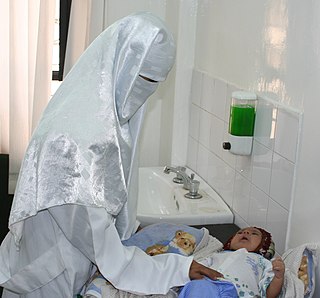
Women in Yemen have historically been placed at a disadvantage due to their gender, with a highly patriarchal society. Although the government of Yemen has made efforts that will improve the rights of women in Yemen, many cultural and religious norms, along with poor enforcement of this legislation from the Yemeni government, have prevented Yemeni women from having equal rights to men.

Ukuthwala is the South African term for bride kidnapping, the practice of a man abducting a young girl and forcing her into marriage, often with the consent of her parents. These "marriages by capture" occur mainly in rural parts of South Africa, in particular the Eastern Cape and KwaZulu-Natal. The Basotho call it tjhobediso. Among the Xhosa and Zulu people, ukuthwala was once an acceptable way for two young people in love to get married when their families opposed the match. Ukuthwala has been abused, however, "to victimize isolated rural women and enrich male relatives."
According to UNICEF, child marriage is the "formal marriage or informal union before age 18", and it affects more girls than boys. In Afghanistan, up to 57% of girls are married before they are 19. The most common ages for girls to get married are 15 and 16. Factors such as gender dynamics, family structure, cultural, political, and economic perceptions/ideologies all play a role in determining if a girl is married at a young age.

Women in Chad, a landlocked country in Central Africa, are the mainstay of its predominantly rural-based economy and they outnumber the men. Chad is a country with diverse and rich cultural practices, such as male beauty pageants and long-kept-secret hair products. Despite their numbers in the general population, there are very few women in governmental positions and gender equality is far from being a reality in Chad. Chad is rated as the third worst country in Africa for gender equality by the World Bank. Additionally, there are few women who reach higher education, and many who receive a college degree do so outside of the country.
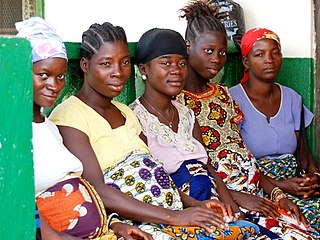
The extent of gender inequalities varies throughout Liberia in regard to status, region, rural/urban areas, and traditional cultures. In general, women in Liberia have less access to education, health care, property, and justice when compared to men. Liberia suffered two devastating civil wars from 1989–1996 and 1999–2003. The wars left Liberia nearly destroyed with minimal infrastructure and thousands dead. Liberia has a Human Development Report ranking of 174 out of 187 and a Gender Inequality Index rank of 154 out of 159.
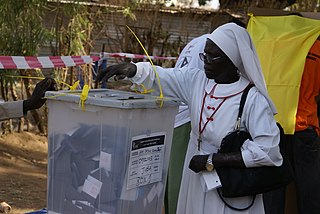
Women in South Sudan are women who live in and are from South Sudan. Since the Independence of South Sudan on 9 July 2011, these women have gained more power but still face issues of inequality. Many women in this area do not have adequate access to health resources and education. While these women often face inequality, there has been progress since South Sudan's official declaration of independence. In recent years, this inequality has gained national attention and people have become more interested in the issue of child marriage that this area faces. Along with this, there has started to be a focus on the very high level of maternal mortality in South Sudan. With a maternal mortality rate of 789 deaths per 100,000 live births, South Sudan has one of the highest rates in the world.
Wedding customs in Ethiopia vary among the diverse tribes of the country, and are among the most important expressions of each tribe's culture.

Child marriage is a marriage or union between a child under the age of 18 to another child or to an adult. Child marriage is common in a multitude of African countries. In South Sudan, child marriage is a growing epidemic. Child marriage in South Sudan is driven by socioeconomic factors such as poverty and gender inequality. Current figures state that South Sudan is one of the leading countries in the world when it comes to child marriage. Child marriage has negative consequences for children, including health problems and lower education rates for South Sudanese girls. Many initiatives have been taken to combat child marriage in South Sudan, but the presence of societal norms and instability continues to drive its presence in the nation.
Child marriage in the Democratic Republic of the Congo is the eighteenth highest in the world. In a child marriage, one or both parties are under the age of eighteen years old. In the Democratic Republic of the Congo (DRC), 37% of girls are married before they turn eighteen, and 10% of girls are married before age fifteen. Though significantly less than the rate of child marriage for girls, 6% of boys in the DRC are married before age eighteen.













